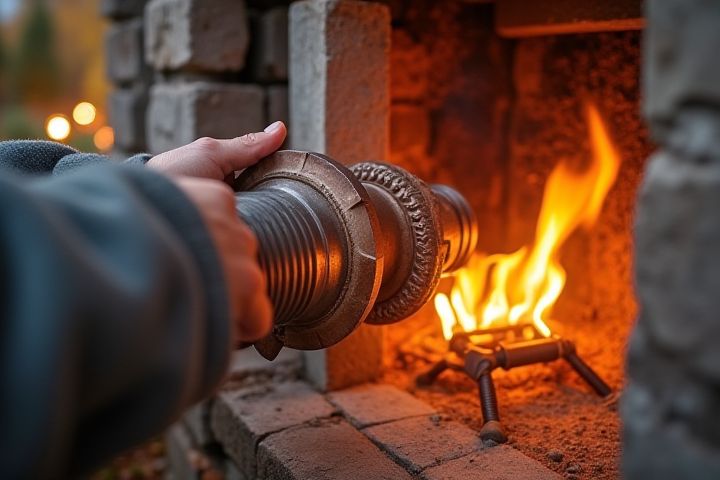
To heat a house efficiently, consider the insulation quality of your home, as proper insulation minimizes heat loss. Utilizing a programmable thermostat allows you to set temperatures according to your schedule, optimizing energy usage. Invest in energy-efficient heating systems, such as modern furnaces or heat pumps, to provide consistent warmth while reducing utility bills. Sealing drafts around windows and doors can prevent cold air infiltration, enhancing overall comfort. Regular maintenance of your heating system ensures it operates at peak efficiency, prolonging its lifespan and saving you money in the long run.
How To Heat A House Efficiently
Insulation quality
High-quality insulation significantly enhances your home's energy efficiency, reducing heating costs by up to 30%. Materials such as spray foam, fiberglass, and cellulose effectively minimize heat loss, ensuring a consistent indoor temperature. Properly insulating areas like attics, walls, and floors can contribute to a cozy environment during the winter months. Investing in insulation not only saves you money but also lowers your carbon footprint, promoting a more sustainable living space.
Energy-efficient windows
Energy-efficient windows significantly improve your home's heating efficiency by minimizing heat loss during colder months. These windows typically feature multiple panes, low-emissivity coatings, and insulating frames that enhance thermal performance. By choosing windows with high energy ratings, you can ensure reduced reliance on heating systems, resulting in noticeable energy savings and a warmer indoor environment. Investing in energy-efficient windows not only improves comfort but also contributes to lower utility bills and a reduced carbon footprint.
Programmable thermostats
Programmable thermostats can significantly enhance the energy efficiency of your home heating system, potentially saving you up to 30% on your heating bills. By allowing you to set specific temperatures for different times of the day, these devices adapt your heating needs based on your schedule, ensuring that energy isn't wasted when you're not home. Many models offer smart features, enabling remote access via your smartphone, so you can adjust settings on-the-go for optimal comfort. Investing in a programmable thermostat not only lowers your energy consumption but also creates a more consistent and pleasant living environment.
Regular HVAC maintenance
Regular HVAC maintenance is crucial for heating your home efficiently, increasing energy efficiency by up to 15%. A professional inspection typically includes cleaning or replacing filters, which can improve airflow and reduce energy consumption. You should also schedule annual check-ups for your system, ensuring components like the thermostat and ducts are functioning optimally. By investing in regular maintenance, you can extend the lifespan of your heating system, potentially saving you hundreds of dollars in repairs or replacements.
Zoning systems
Zoning systems can significantly enhance your home's heating efficiency by allowing targeted temperature control for different areas. Typically, these systems use multiple thermostats, which can help maintain comfort while saving energy; for instance, nearly 30% of energy costs can be reduced by heating only occupied spaces. By effectively managing airflow through dampers, you can easily redirect heating to high-use areas, ensuring every room remains cozy. Using a zoning system not only optimizes your energy consumption but also prolongs the lifespan of your HVAC equipment by reducing workload.
Renewable energy sources
To heat your house efficiently, consider implementing renewable energy sources such as solar thermal systems or biomass heating. Solar thermal panels can convert sunlight into heat, potentially reducing heating costs by up to 70%, while biomass boilers use organic materials, providing an eco-friendly alternative to fossil fuels. Geothermal heat pumps leverage the earth's stable underground temperature, delivering an efficient heating solution with a performance ratio often exceeding 3.0. Investing in these technologies not only decreases your carbon footprint but can also lead to significant long-term savings on energy bills.
Sealing air leaks
Sealing air leaks is vital for heating your house efficiently, as it prevents warm air from escaping and cold air from entering. Inspect areas such as windows, doors, and attic spaces for gaps and use weather stripping or caulk to eliminate drafts. This simple yet effective measure can significantly reduce heating costs by maintaining a consistent indoor temperature. By prioritizing air sealing, you enhance both comfort and energy efficiency in your home.
Curtains and blinds use
Installing thermal curtains or blackout blinds can reduce heat loss by up to 25%, significantly improving your home's energy efficiency. During the day, keeping your curtains open allows sunlight to naturally warm your living spaces, while closing them at night insulates against cold air. Using reflective blinds can also redirect sunlight back into your home, enhancing warmth in winter months. Make it a habit to adjust your window treatments based on the time of day and season for optimal heating results.
Radiant floor heating
Radiant floor heating systems effectively distribute warmth across your home by utilizing electric cables or warm water tubes installed beneath the floor surface. This method ensures even heat distribution, eliminating cold spots often associated with traditional heating systems. With radiant floor heating, you can enjoy increased energy efficiency, as it operates at lower temperatures while providing a comfortable environment. Implementing a programmable thermostat also allows you to optimize usage, further enhancing energy savings while keeping your living space cozy and inviting.
Smart home technology integration
Integrating smart home technology can significantly enhance the efficiency of heating your house, leading to reduced energy consumption and lower utility bills. Smart thermostats, like the Nest or Ecobee, allow you to set schedules and adjust temperatures remotely, optimizing your heating patterns based on when you're home or away. By pairing these devices with smart vents, you can control airflow in specific rooms, maintaining comfort while minimizing wasted energy. Furthermore, utilizing energy monitoring systems can provide real-time data on your heating usage, empowering you to make informed decisions about your home's energy efficiency.
